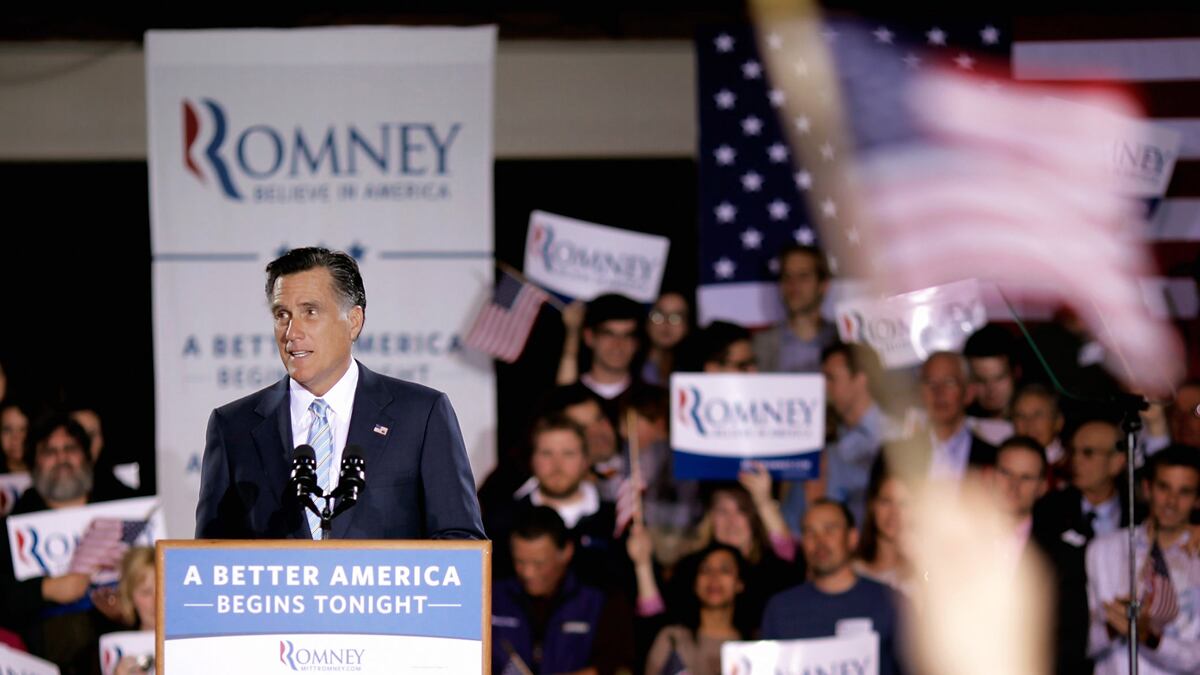At first blush, it looked so deftly orchestrated on Tuesday—Mitt Romney giving his blistering “prairie fire” speech on the debt, and John Boehner telling Pete Peterson and crowd that he relishes forcing another debt-ceiling showdown. The old one-two. Dominated the headlines. The speeches appeared to reflect a shift in focus to debts and deficits. But is this really where Romney wants to go? And in the company of Boehner? What’s next, an ethnic sensitivity speech at Mel Gibson’s place?

First of all, Romney’s speech was completely out of control. Several people have torn it to pieces already, so I needn’t do that. What remains interesting, though, is why he would choose to talk in such an incendiary way about a topic that is such an obvious liability for him.
Why is it a liability? Because of the two candidates running for president, only one has proposed a tax plan that would send the deficit soaring to ever-new heights, and that candidate is Romney. It’s hard to come up with a concrete number, because Romney won’t say which loopholes he’d close. But the deficit will balloon by at least several hundred billion dollars, and maybe a few trillion. The reason it will do so, of course, is that the most important thing for Republicans to do is to reduce the tax revenues the federal government collects, especially from the top 1 percent. Indeed, under Romney’s proposal, they will see their average tax bill fall by around $150,000 a year. If Romney wants to open up that conversation, he can be my guest.
Now let’s consider Boehner’s role here. We know that he has to play to the cheap seats in his caucus, or else they’re going to dump him next year and make Eric Cantor the speaker. Fine. And we know that many independents like to hear tough budgetary talk. That’s fine, too. By these measures, what he’s doing makes very clear political sense.
But if I were Romney, I’m pretty sure I’d be leery of this. It’s apparently not likely, says Tim Geithner, that there will be a debt-ceiling battle before the election. But let’s say that at the very least, Boehner and his restive caucus make some kind of dramatic move to keep the debt issue alive over the summer: They release a list of draconian budget cuts, for example, and say that they won’t budget until Obama agrees to every single one of their cuts. That puts Romney in a spot. As he’s trying to move to the center, he has to endorse a far-right set of principles dictated by a bunch of Tea Partiers. Um, who’s the presidential candidate here anyway?
It also gives Obama a free shot at tying Romney to the hard right, and to the whole set of polarization-dysfunction issues that sent the congressional GOP’s approval ratings down into Kardashian territory during the last debt fight. Obama can say to voters: “Look at how far-right congressional Republicans are going lead this guy around by the nose if he becomes president.” Most independents may want tough talk on the deficit, but they certainly don’t want the Tea Party running the country.
Can Romney keep his distance from Boehner? Typically in presidential election years, the presidential nominee is given lots of free rein by others in the party to run whatever sort of campaign he needs to run to win. But the strange brew of Romney’s suspect right-wing credentials and the no-compromise posture of the Tea Party wing might make that a bit trickier this time around the track.
The polls have tightened in the last month for two reasons. First, the jobs reports haven’t been so great. And second, Romney isn’t running in primaries anymore, so he’s not talking about taking away contraception and hating on immigrants and all those things. He hasn’t really done anything affirmative that I can see to move to the middle, but the mere fact that he’s not up there on a stage anymore with Rick Santorum and Newt Gingrich has definitionally removed him from a certain category of crazy. But Boehner and Cantor and the House GOP caucus could certainly drag him back there.
The Tea Party obviously still has a lot of staying power. Dozens of its candidates, for Senate and House, will be out there this fall. Romney will of course stay miles away from them physically. He’s not going to be attending any Purdue games with Richard Mourdock. But the Tea Party ethos is going to be out there in the atmosphere. Boehner has to acknowledge its existence, and Romney is going to have to as well. We don’t know what he’s going to do, but we do know that he hasn’t said no to the far right yet.






